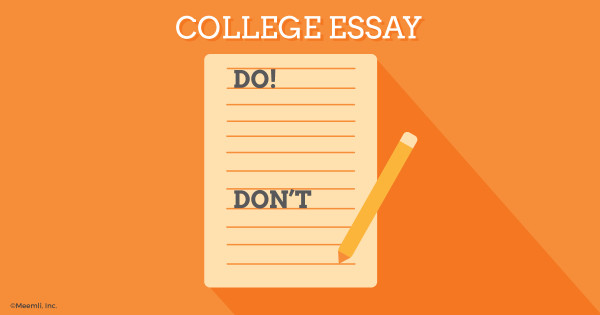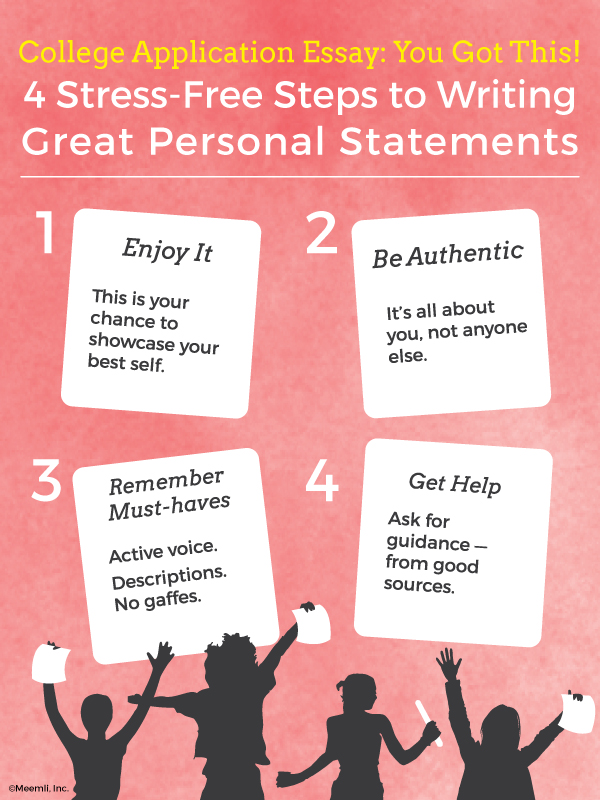Experts’ Tips for College Essay Success
(Please share this with the college-bound teen in your life!)
The time has come: You’re applying to college. Are you freaking out yet? If you are, you’re not alone. Applying to college can be a nerve-wracking process for countless high school seniors, especially one particular activity…writing the essay.
“How do I squeeze everything there is to know about me into 500 words?”
“My life is so boring! I don’t know what to write about.”
“If I don’t write a good essay, I won’t get in anywhere!”
We asked our awesome College Essay workshop development team to share their top tips for college essay success and they jumped right in.
Check Your Dos and Don’ts!
One thing they all agree on is to pay attention to the “dos and don’ts” when writing your college essay. Grammar and spelling are important, as are these other writing tips:
- Write in your own voice
- Use an appropriate tone
- Avoid slang
- Use descriptive details
- Be concise
You’ve probably seen these in many ‘how to’ posts on the college essay and that’s because these are fundamental – so make sure you pay attention to them!
Just Start Writing
Noël Young believes that often students get caught up in a spiral of trying to figure out what to write before they write it. She suggests they just write.
Don’t be self-conscious or worry about grammar or how it might sound; just get it all down on paper and then go back and revise it. Sometimes the biggest block is trying to follow all the rules and make it perfect right away. Instead, she suggests, “write what you feel without concern for rules so that you are free to get all of your ideas out. As you write, you may even discover something about yourself.”
Shelley Aschliman heartily concurs.
I agree that “just starting” is a great start! A lot of times essays can start out very patchy — like you think of one single paragraph to write or one little story you could tell. Start there. Even if you don’t even know where you’ll end up. One idea can often lead to another and then you can collect all those little stories to tell something big about yourself. Look for patterns or themes. What could the pattern show about you? (Kind of like using a picstich on Instagram…)
It’s All About You!
Raja Ashraf asserts that it is counter-productive to think about what others are going to write and the rest of the team heartily agrees. Trying to match your ideas to what other students might be writing or what you think the admissions committee wants to hear, will only prevent your true self from shining through. When you try to write something that isn’t real, it shows. Primary rule of personal statements: Be Authentic!
And also, show that you are mature and reflective and can share the real you. Since few teens have a lot of experience writing about themselves, they often resort to just repeating their activities and accomplishments. Alternately, they just write about their feelings, airing their grievances using the essay as therapy!
So, remember to write about how your activities and experiences shaped you, not just what they were, and what you learned from facing your challenges, not just how difficult they were to overcome. And, adds Susan Tu, ” we don’t want you to lie and embellish your experiences, but we also don’t want you to be overly modest. Recognize and be proud of your accomplishments!”
You Have A Story!
When reviewing applications at Stanford, Raja was most impressed by the students who wrote about something ordinary in a most extraordinary way. Let’s face it, most students do not have extraordinary experiences by the time they are 17 years old. And they shouldn’t feel bad about it. Instead, they should learn to look deeper and find the gold that they can share.
Susan tells this helpful story from her high-school counseling days. Jessica worked incredibly hard at school, then took care of her little brother while her mother worked, and did her homework (and got great grades) while her family slept. She didn’t think it was anything special, it was just something she did all the time, so she told Susan “I have nothing to write about!”. With a little prodding, Susan was able to unearth the truth behind Jessica’s daily life and show her that she had “extraordinary” circumstances and accomplishments.
You don’t need to have overcome disease, poverty or handicaps, or built companies and written best-sellers to have something compelling to write about. Shelley adds this reminder “It’s all about HOW you write it. A lot of people might have a similar story, but it’s how you write about it, what you think about it, what it means to you that makes it unique…and worth reading.”
When you’ve written your draft, think about “How do I come across? What kind of person will be reader think I am?”.
Raja and Susan both recommend that you have someone who doesn’t know you well read your essay and give you a very brief summary of what they got from it. That should help you figure out if you’ve got your message across.
(Don’t have someone who can help review your essay? Check out Meemli’s College Essay Expert Review option to get fast, detailed feedback on your essay from our awesome team!)
We’d like to wrap up with one more insight from Noël:
The most memorable essays I have read have always told me a story. I forget that I am reading an academic essay and feel like you are sitting next to me, telling me your story.
We hope your story is a great one and we wish you all the best in your journey to college!


